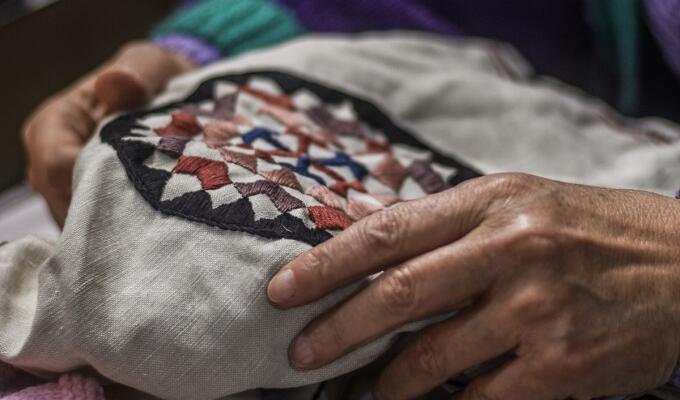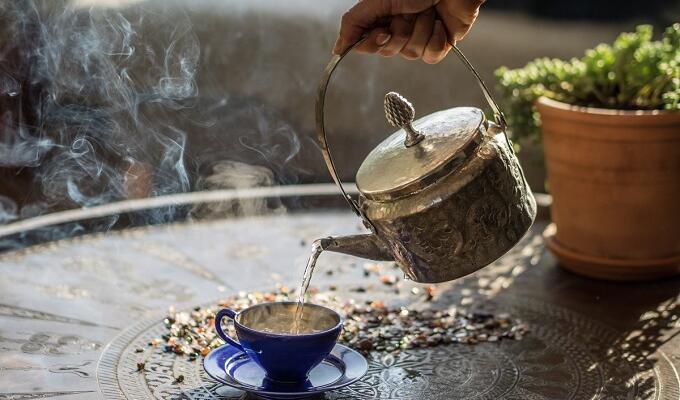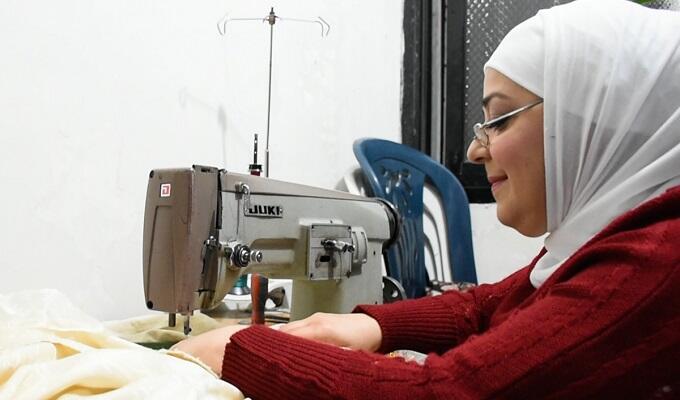


Aleppo artisans sell copper, embroidered handiworks to foreign buyers (en)
Artisans in Aleppo recently received good news when they learned they secured sales from international buyers: One buyer took 95 copper pieces, another bought 30 embroidered cushions and dolls – and other orders may be on the horizon.
The news not only means much-needed income for the artisans and handicraft makers – most of whom are internally displaced – but also shows there is a wider market for well-made, traditional Syrian goods such as copper canisters, teapots and embroidery.
The 16 copper craftsmen and 10 women textile designers learned how to adapt their products to appeal to foreign tastes through an International Trade Centre (ITC) project aimed at enabling trade through digital channels to encourage entrepreneurship in Syria. The project, financed by the Government of Japan and carried out in partnership with the United Nations Development Programme, involved technical assistance, training – including distance learning – and engagement with local institutions.
‘They are very beautiful products as a result of ITC work on product development and product design,’ ITC project manager Eman Beseiso said of the designs that the project beneficiaries developed. ‘In fact, the trainings enabled the artisans to progress not only on the professional level, but also on the personal level, through the empowerment impact the project has created.’
Resurrecting art forms
Among the initial challenges was persuading the artisans to modify their creations to suit international buyers while promoting their culture and traditions, said project consultant Riley Salyards.
‘Many of the artisans have had their craft and tradition passed down through their grandfathers and fathers,’ she said. ‘Their families have known these traditions for generations, and they are all worried that their craft will die out and end with them – the copper artisans in particular.’
The way forward, Salyards says, focuses on ‘resurrecting art forms and crafts from Syria that will be uniquely understood and appreciated in the world’.
There were other challenges when the project began in April 2018: The artisans lacked tools, usable workspace, financing, access to quality local raw materials and skilled assistance. They also didn’t understand pricing and production capacity requirements, and they had limited means to promote or market themselves.
Not all of these issues were resolved by the time the project ended on 28 February, says Rania Kinge, a Swiss-Syrian designer whose Made by Women association helps displaced Syrian refugee women earn a living by creating handmade jewelry and accessories that are sold worldwide.
‘Wow, wow, wow’
It was one of Kinge’s clients, Yola Jahshan, who ordered 95 pieces made by the coppersmiths. Her first reaction upon seeing photos of the Aleppo handicrafts: ‘Wow, wow, wow, loved the copper and embroidery and am very much interested to have them as soon as possible – a complete line of products.’
Made by Women, which exports in large enough quantities to benefit from preferential prices for logistics, is arranging the shipment of the 95 copper items from Damascus to Amman. Jahshan will collect the pieces in the Jordanian capital and transport them herself to Algiers, where she has a boutique called YJ.
Kinge’s association also offers other services to the artisans for free – such as exhibiting their goods in Geneva, providing an e-commerce site for them and handling dispatching, payments and logistics for online sales on its website. This means the Aleppo craftspeople will be able to process future orders.
Engaging buyers in Lebanon, Australia, United States
The next buyers could come from Lebanon or Australia. The owner of a boutique in Canberra is ‘very interested’ in canisters and embroidered pouches, says Kinge. Ibu, a United States-based network of craftswomen in 38 countries, gave very positive feedback about the Aleppo products.
Seamstress Ghoufran Djodoue says her dream following the ITC training is to reopen the dress shop she had in Aleppo before the war forced her to flee. Many of her clients thought her designs were European, says Djodoue, whose goal is to show people that products originating in the ancient Syrian city can be both beautiful and high quality.
One challenge that she and the other artisans will face is producing the quantities needed to export. The goal is for Made by Women to continue helping the craftspeople by digitizing their products – providing bar codes and putting the goods online, for instance. This would help ensure that export opportunities remain for the artisans.
‘Although Syria is isolated, the connection between Geneva and the Syrians is going to help sustain the results of this project,’ Beseiso said.



